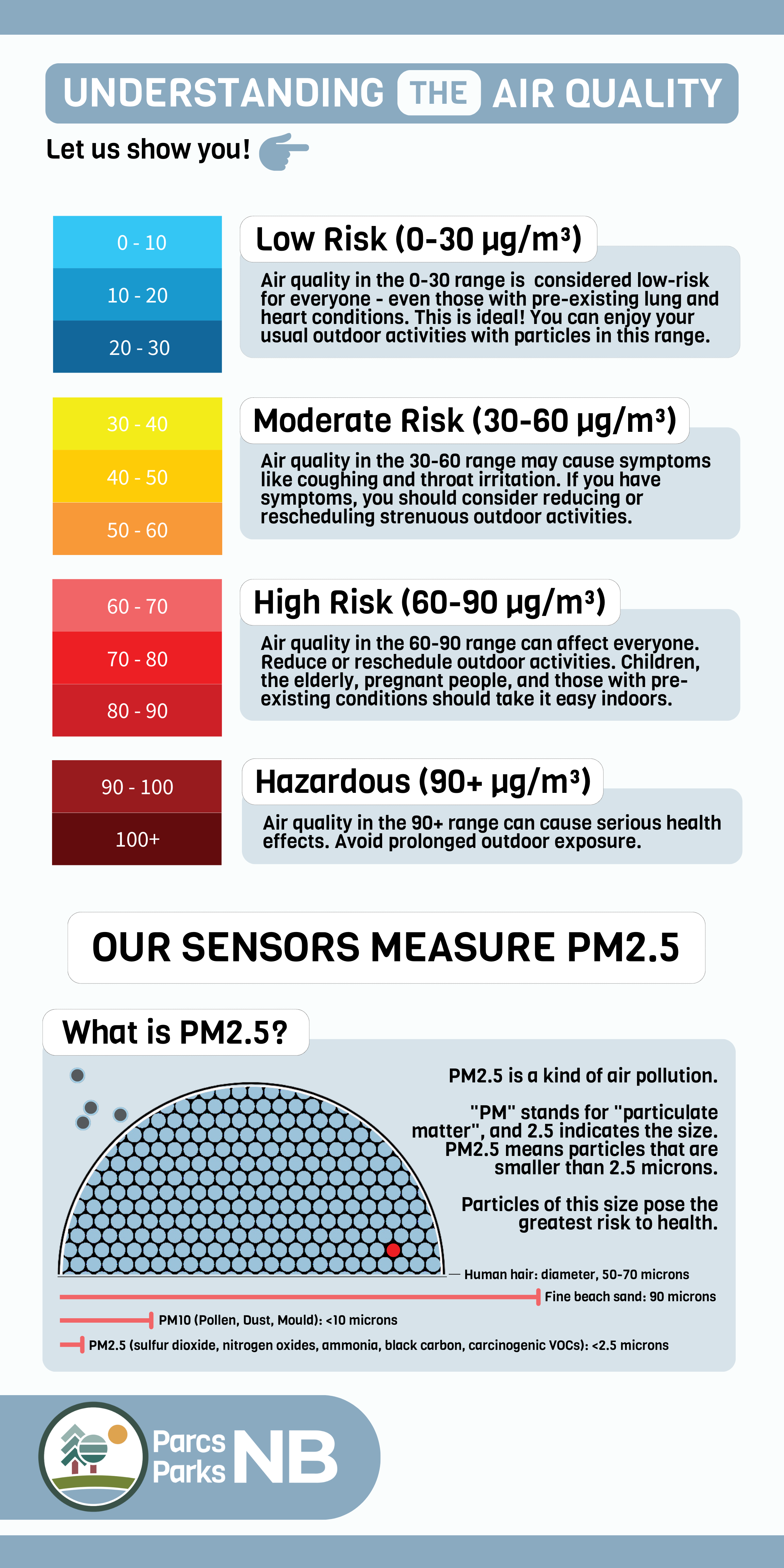Air Quality Monitoring :
live updates from across NB
Did You Know?
Checking the AQHI along with the UV index can help ensure a safe & healthy day outdoors.
New Brunswickers generally enjoy good air quality, but in 2023, Canada suffered its worst wildfire season ever. Every province felt the impact of smoky, polluted skies – including New Brunswick.
Volatile air quality conditions make it harder to spend time outside. Polluted air poses serious health risks, and fine particles – the most dangerous kind of air pollution – are often odourless and invisible to our eyes.
As New Brunswickers we’ve always enjoyed the outdoors, and that’s why NB Lung is thrilled to announce a new partnership with Parks NB to bring PM2.5 air quality monitoring to our Provincial Parks.
Provincial Parks of New Brunswick
Parks visitors can now access real-time PM2.5 air quality information from on-site sensors at every location. Each one is paired with educational signage that helps make sense of the science, so that guests can remain informed of the health risks from worsening particle pollution during air quality events.
The sensors serve as a complement to existing Parks NB weather stations, pollinator gardens, native plant gardens and other learning displays, telling a deeper story of New Brunswick’s natural environment to inspire wellness and the enjoyment of all that our natural spaces have to offer.
Clean air is a natural resource to be celebrated!
So – whether your perfect day involves lounging on the beach, camping with friends and family, adrenaline-filled mountain biking, a leisurely forest walk, or paddling out to do some fishing in your canoe or kayak – be sure to check the air quality before you hit the trails (or water!) and breathe easy during your next Parks visit!
Parks NB locations:
- The Anchorage Provincial Park
- Sugarloaf Provincial Park
- République Provincial Park
- Parlee Beach Provincial Park
- North Lake Provincial Park
- New River Beach Provincial Park
- Murray Beach Provincial Park
- Mount Carleton Provincial Park
- Mactaquac Provincial Park
- Hopewell Rocks Provincial Park
- Herring Cove Provincial Park
For over 20 years, NB Lung has been a leader in national environmental health issues.
The network of fine particulate matter (PM2.5) sensors you see today in NB originated in 2020, born of a collaboration between NB Lung and Environment and Climate Change Canada (ECCC) to investigate the usefulness of using small sensors to augment the official National Air Pollution Surveillance program data.
Throughout the project, volunteer “citizen scientists” hosted sensors at their homes and kept track of their own observations – what they could see and smell in the air – to give ECCC air quality scientists real world context for the sensor measurements.
The pilot network of small sensors remains active today and has continued to grow beyond the original project. ECCC climate scientists use the data to help improve the Air Quality Health Index (AQHI) forecasting and address gaps in national air quality prediction and services
Citizen Science is another name for public participation in environmental research.
Citizen science is a cost-effective way of capturing more wide-spread data, and anyone can do it! Installing your own PM2.5 sensor is a great way to ensure your own community is included in the latest research.
If you or your organization is interested contributing to air quality monitoring efforts in NB by becoming a citizen scientist, NB Lung can help you with advice on purchasing and setting up your own small sensor.
For more information, contact Leah Hemphill:
For data-specific requests about the sensor network, please contact:
NB Lung has been helping New Brunswickers breathe easier since 1933.
Thank you for your support!
Page Last Updated: 28/02/2023

